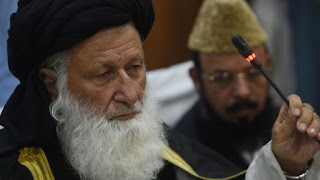Who are the Pakistani group proposing to 'lightly beat' women?
A Pakistani group has come under
fire for drafting a women's protection bill that suggests a husband can
"lightly beat" his wife to keep her in line. What is this body and
does it have any real power? The BBC's M Ilyas Khan explains.
It
is called the Council of Islamic Ideology
Created by
a military government in 1961, the Council of Islamic ideology (CII) is a
20-member constitutional body that advises the government on religious aspects
of the law and society - but its recommendations are not binding.
The
constitution says CII members should be "well-qualified". It
specifies that the council should have at least two retired judges, four
members with a minimum of 15 years of experience in Islamic research and
teaching, and that members should have an "understanding of the economic,
political, legal or administrative problems of Pakistan".
In
practice though, this definition has been stretched to include men from
religious pressure groups whose careers have been limited to administering or
teaching in religious seminaries where contemporary knowledge is looked down
upon.
So many of
the CII's proposals have not been taken seriously by leaders.
The
proposal to 'lightly beat' women
No stranger to controversy, the CII has
faced unprecedented criticism as a result of the draft women's protection bill.
Portions of the draft leaked to the media
recommend a husband should be allowed to "lightly" beat his wife if,
among other things, she refuses to dress properly or turns down overtures for
sexual intercourse.
It also prohibits female nurses from taking
care of male patients, and bans the presence of women in receptions held for
visiting foreign dignitaries.
Punjab Law Minister Rana Sanaullah rejected
the proposals, saying: "Islam does not allow any violence, whether against
women or children."
Lawyer and human rights activist Asma
Jahangir told Geo TV that the proposals amounted to "the humiliation of
women".
The independent Human Rights Commission of
Pakistan termed the proposals "ridiculous", and recommended the
abolition of the CII.
So why did they come up
with the recommendations?
The CII proposals were a response to a
women's protection law passed by the Punjab government in March.
That law wanted to make it easier for
female victims of domestic violence to report abuse, and introduced procedures
to keep the perpetrator away from the victim until the dispute was resolved.
The CII was opposed to the law, and
declared it un-Islamic.
The Punjab government has delayed enacting
the law - even though the CII's rulings are not binding.
The council has been
issuing rulings for decades - with mixed results
No stranger to controversy, the CII has
faced unprecedented criticism as a result of the draft women's protection bill.
Portions of the draft leaked to the media
recommend a husband should be allowed to "lightly" beat his wife if,
among other things, she refuses to dress properly or turns down overtures for
sexual intercourse.
It also prohibits female nurses from taking
care of male patients, and bans the presence of women in receptions held for
visiting foreign dignitaries.
Punjab Law Minister Rana Sanaullah rejected
the proposals, saying: "Islam does not allow any violence, whether against
women or children."
Lawyer and human rights activist Asma
Jahangir told Geo TV that the proposals amounted to "the humiliation of
women".
The independent Human Rights Commission of
Pakistan termed the proposals "ridiculous", and recommended the
abolition of the CII.
So why did they come up
with the recommendations?
The CII proposals were a response to a
women's protection law passed by the Punjab government in March.
That law wanted to make it easier for
female victims of domestic violence to report abuse, and introduced procedures
to keep the perpetrator away from the victim until the dispute was resolved.
The CII was opposed to the law, and
declared it un-Islamic.
The Punjab government has delayed enacting
the law - even though the CII's rulings are not binding.





Comments
Post a Comment